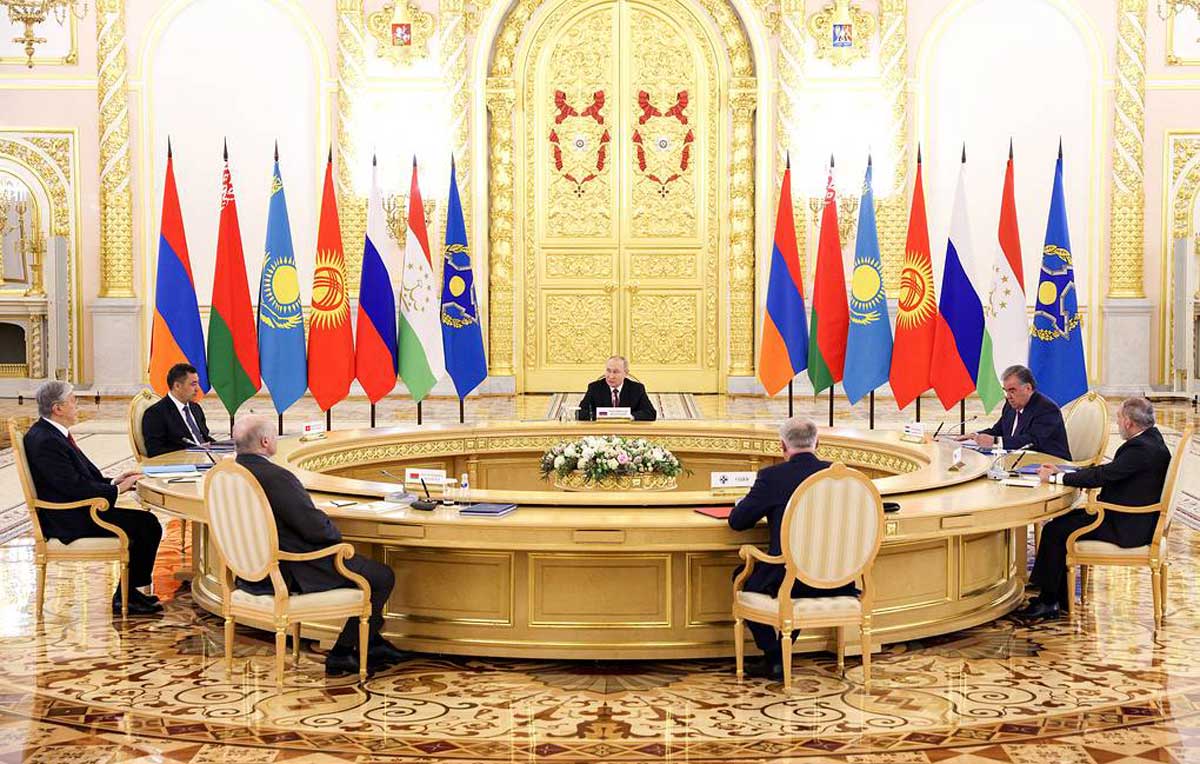The Russian Federation resumes its invasion of Ukraine with little concern for the country’s sanctions, loss of soft power, and numerous military losses. Despite spending much of 2025 attempting to decouple Russia from China, the Kremlin has not reciprocated with goodwill to the Trump Administration. Instead, Moscow continues to stall negotiations to buy time to complete its military objectives.
Instead, Moscow can be brought under pressure for a negotiated settlement or full military withdrawal from Ukraine by limiting Russian influence as much as possible through its defense alliance, the Collective Security Treaty Organization (CSTO). A coalition that is thinly held together, CSTO has increasingly fractured in Moscow’s orbit, and the West has a chance to pressure the Russian government by isolating Russia from its own military alliance.
Ongoing Attempts to End the Russian Invasion of Ukraine
Against the backdrop of Donald Trump assuming the presidency for the second time, the Administration has made a key goal to try to end the Russian invasion of Ukraine as quickly as possible. Originally trying to decouple Russia from China, the Administration attempted to bring the Kremlin to the negotiating table by voting against a United Nations resolution condemning the invasion, reducing weapons deliveries to Ukraine, and applying more pressure on Kyiv than Moscow.
Instead, Washington has found itself at a crossroads as the Kremlin has continued an aggressive posture, even when the U.S. government publicly ambushed Ukrainian President Volodymyr Zelensky as an attempt to bring Moscow to the table.
The Alaska Summit was intended to find a close solution to ending the war in Ukraine—potentially frozen lines akin to those on the Korean Peninsula, without guaranteed NATO membership for Kyiv. Still, Moscow’s demands included no Western troops providing peacekeeping, full sanctions lifting, and the entirety of the Donbas region, which Russian forces still do not control fully, including the remaining fortress cities under Ukrainian control.
Seeking options to finally bring Moscow to concrete talks, the U.S. and Western governments should utilize their global soft power by decoupling countries long considered Russian vassals and helping them grow more independent of Russia.
Russia is Losing Control of Its Former Sphere of Influence
During the invasion of Ukraine, Russia has suffered militarily and diplomatically. Countries that were initially hesitant to upset the Kremlin have begun to reassess their relations with Moscow, including some CSTO member states.
Formed in 2002, the CSTO comprises Russia, Belarus, Kazakhstan, Kyrgyzstan, Tajikistan, and Armenia as its member states. However, not all members of CSTO have been synchronized and on the same page.
Kyrgyzstan and Tajikistan have experienced numerous border clashes due to the Soviet Union’s reconfiguration of their perimeter. Belarus and Armenia are engrossed in a diplomatic conflict, and Kazakhstan has pushed back against Russia’s historical revisionism, moving closer to China. Furthermore, due to numerous inactions taken by Russia during the Second Karabakh War, Armenia has not only strained relations with the former but also limited their participation in CSTO.
Outside of the CSTO, Russia has also suffered military setbacks and lost influence in certain parts of Africa and the Middle East. Russian mercenaries are taking heavy casualties in the Sahel with their junta allies in Mali and Sudan on the back foot against jihadists, Tuareg separatists, and the Sudanese army, respectively.
Against the backdrop of the collapse of the Ba’athist Syrian military, Russia would lose its strategically important naval base in Tartus and its only military stronghold in the Middle East. Without Syria, not only is Russia’s Mediterranean fleet limited in maritime maneuvers, but also the shadow fleet of tankers will not have a key base to dock and export fuel to continue the Kremlin’s war effort.
How to Bring CSTO Nations into the Fold
Russia’s costly and miscalculated invasion and prolonged occupation have only isolated the country into a de facto vassal status of China. With waning Russian influence, the West can use rapprochement policies towards CSTO countries to decouple them from the Kremlin’s orbit.
In Central Asia, Kazakhstan, Tajikistan, and Kyrgyzstan have developed closer relations with China and Turkey; however, pivotal Western policies, such as the United States’ promotion of sovereignty without Russian interference in 2023, have also played an integral role in enhancing relations in the region. President Trump could continue advancing this Biden Administration policy that further sidesteps Russia while ongoing trade negotiations continue.
In the South Caucasus, the economic corridor submitted between Azerbaijan and Armenia as part of a planned peace agreement has excluded Russia from the finalized documents. The Trump Administration scored a key diplomatic victory after years of the U.S. government’s rapprochement with Armenia following the 2020 war.
France has played a key role in American relations in the South Caucasus, as Paris is at the forefront of limiting Russian influence in the region, as Moscow has done the same towards French soft power in Africa. With Armenia’s government showing signs of wanting to transform into a full Western democracy with potential European Union membership, the U.S. should, in the future, promote Yerevan towards non-NATO ally status.
Regarding Belarus, its armed forces have shot down more Russian drones than NATO during the ongoing invasion. Alexander Lukashenko, the longtime leader of Belarus, arguably sticks close to Russia after decades of isolation from Europe due to his authoritarian policies.
Nevertheless, the West could initiate a slow and gradual process of rapprochement with Belarus—neither lifting sanctions, but offering Lukashenko amnesty and potential exile in a comfortable villa if the Belarusian autocrat promotes democratic norms and gradually drifts away from Russia.
Utilizing soft power, not just through sanctions, is a policy the West can use going forward to apply pressure on Russia. With Moscow’s drifting soft power in several regions while relations with CSTO continue to drift, the United States and Europe have an opportunity for rapprochement to isolate the Kremlin further and bring the Russian government to get serious in negotiations for their invasion of Ukraine, finally.
